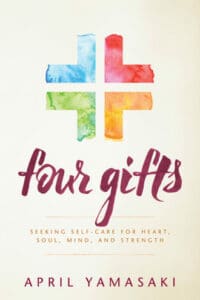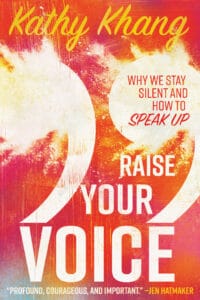
It is true that we are broken. And that makes things messy. But brokenness is only part of the journey. The trap we often fall into is, as Bryan Stevenson puts it, our “comfort level with reducing people to their worst act and acting in very extreme, harsh, punitive ways.” We are not the worst thing we have ever done. Neither is anyone else. Our brokenness is not the totality of who we are, and when we can find a way to see it, our brokenness is also a gift.
When we invest ourselves—in our communities, our families, our churches, our relationships—brokenness is part of the journey. Parker Palmer says it this way:
If you hold your knowledge of self and world wholeheartedly, your heart will at times get broken by loss, failure, defeat, betrayal, or death. What happens next in you and the world around you depends on how your heart breaks. If it breaks apart into a thousand pieces, the result may be anger, depression, and disengagement. If it breaks open into greater capacity to hold the complexities and contradictions of human experience, the result may be new life.
And so let’s reconsider our talk of brokenness. Let’s hold it up to the Light and consider whether we’ve been broken open or apart by this life and the world in which we’re living. When thinking of it this way, it’s easier to see how our systems often end up being forces for destruction and pain, hurling broken shards of power and pride at those who happen to find themselves holding the short straw. The same is true for relationships that break our hearts. These experiences can make us or break us, as they say. As ambassadors of the kingdom of God and agents of reconciliation, we are invited by God to boldly present our heartbreak to him and let him transform it so that even our broken hearts become conduits for wholeness, in some crazily mysterious metamorphosis of grace and hope.
We are not the worst thing we have ever done. Neither is anyone else.
Bryan Stevenson says, “There is a strength, a power even, in understanding brokenness, because embracing our brokenness creates a need and desire for mercy, and perhaps a corresponding need to show mercy. When you experience mercy, you learn things that are hard to learn otherwise. You see things you can’t otherwise see; you hear things you can’t otherwise hear. You begin to recognize the humanity that resides in each of us.”
Regaining Focus
All around us, people have gotten bold in their denunciations of one another. We have grown brave in our dismissals of another person’s story. We have become experts at driving a wedge instead of building a bridge. Whether the topic is race, sexual orientation, abortion, global warming, terrorism, or immigration, it really doesn’t matter. Our collective language has grown vitriolic. We are drowning in our fear of the future, dislike of our neighbors, an affinity for comfort, a general distrust, and a tragic loss of hope.
If we’re not careful, we might get caught up in the fallout. We might lose focus and feel our feet start to slip. What does that look like? How does it feel? It looks like throwing in the towel or taking sides or trying to exact revenge. It feels like worry, doubt, and hopelessness. It manipulates anger and fear, and it manifests in abusive power and marginalization. If we let it simmer, it starts to look, feel, act, and sound a lot like hate.
The language we use when we talk about others, and about ourselves, correlates directly to the condition of our hearts. If there is division in our hearts, our language will perpetuate division in our culture and in the world around us. If we are experiencing a breach in our relationship with God or ourselves, or both, that breach will show up in the impact of our words in the world. When we allow the world around us to divide our attention and distract us from believing in the power of God to overcome evil, we surrender our faith to the storm. This is the true danger of brokenness. When the world—with its worries, fears, grief, and strife—presses in on us, we can succumb to the impulse to look away from God, instead of toward him. The true danger of brokenness is that we allow it to keep us, even lead us, away from God, from others, and from ourselves.
The language we use when we talk about others, and about ourselves, correlates directly to the condition of our hearts.
This is the difference between being broken open and being broken apart. In your own life, have your heartbreaks and disappointments served as an open door or a dividing wall? We needn’t be hard on ourselves when we realize our hurts have made us bitter and our bitterness has made us divisive. This is natural. Additionally, depending on the size of the hurt or the source of our pain, our journey through the heartbreak can feel like a free fall, causing every impulse in us to fight against having our bodies slammed into the ground. With our instincts calibrated toward self-preservation and the ground quickly rushing up to meet us, making a choice to be broken open instead of broken apart seems futile at worst and a luxury at best. The goal, it often seems, is simply to get out alive—no matter who gets trampled in the process.
But there is hope. There is, indeed, a beautiful alternative. This is not the way it’s meant to be. We don’t need to settle for life with our defenses up. We can lower our guard and use that energy for something else. We can get our focus back.
Deidra Riggs is a national speaker, author, and blogger. As founder of JumpingTandem, Deidra leads an online community offering inspiration, encouragement, and a safe place to practice grace. She is a regular contributor to Dayspring’s (in)courage online community. She has been a speaker for TEDx and IF:Gathering and has organized her own women’s retreat. She lives in Lincoln, Nebraska, with her husband, Harry, and their dog, Santana. This excerpt taken from One: Unity in a Divided World by Deidra Riggs, © 2017 Baker, a division of Baker Publishing Group. Used by permission.


